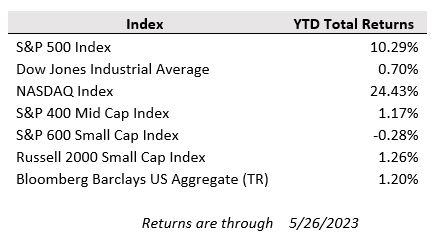U.S. stocks rallied higher late last week as negotiations gained steam toward a deal to raise the debt ceiling, and technology stocks soared on growing optimism around the potential of artificial intelligence. Positive sentiment from a potential deal and AI enthusiasm overshadowed a stronger than expected inflation reading later in the week that sent interest rates higher. For the week, the Dow Jones index lost 1%, but the S&P 500 was up 0.3% and the tech-heavy Nasdaq popped 2.5% for a fifth straight week of gains. The positive market momentum has carried into this week’s early trading as a tentative debt ceiling deal was reached over the weekend.
President Biden and Speaker McCarthy reached agreement on a debt ceiling deal that is very much a compromise between the two sides’ starting points. The Wall Street Journal notes the economic drag will be minimal, especially considering how stimulative the budget was this year, though the precise economic effect is unknowable until the budget is put together. There is some resistance to the agreement because it is not as restrictive as the bill that passed the House in April. Nevertheless, the deal is anticipated to pass through committees in the next couple of days and pass Congress by Friday.
Included in the bill are two years of federal spending limits in exchange for pushing future debt-ceiling discussions beyond the 2024 elections. The bill would bring an end to the Biden administration’s freeze on student loan payments and create stricter work requirements for public assistance programs, including food stamps, though Medicaid won’t be affected. Additionally, it includes a streamlined approval process for energy projects — known as permitting — through the creation of a single agency to oversee the matter. Not included in the bill are any major commitments to reduce the $31.4 trillion national debt. But the Wall Street Journal calculates that nondiscretionary spending cuts could save $860 billion over the next decade, and the reductions aren’t expected to inflict much pain on the economy.
On top of the relief of a potential debt ceiling deal, investor sentiment also received a boost from last week’s quarterly earnings report from Nvidia that further stoked the technology stock frenzy that has driven much of this year’s U.S. equity market gains. Nvidia, one of the largest semiconductor manufacturers that designs chips and software that are specialized for artificial intelligence applications, guided to a significant ramp in earnings expectations for the rest of 2023 that led to a $184B market cap gain for the stock, the third largest single-day market cap gain in U.S. history. After last week’s gains, the market value of the seven largest U.S. tech stocks (Apple, Amazon, Alphabet, Microsoft, Meta, Tesla, & Nvidia) have collectively grown by roughly 50% (over $3.2 trillion) so far this year. Excluding these seven stocks, the S&P 500’s year-to-date total return would be just around 1% today compared to 10% with them included.
The rally in tech stocks is even more pronounced when considered against the sharp recent pick-up in interest rates, which played a large role in last year’s growth stock sell-off. The 2-year and 10-year U.S. Treasury yields closed last week at 4.56% and 3.80% after starting the month at just 4.06% and 3.45%, respectively, as inflation readings remain too high for comfort for the Federal Reserve. On Friday, the Personal Consumption Expenditure (PCE) price index, a favored inflation measure for the Fed, rose 0.4% in April compared to the previous month, higher than economists had projected. On a year-over-year basis, the PCE price index climbed 4.4%. The same report showed that personal income rose 0.4% compared to the previous month, while spending rose 0.8%. In response to the disappointing report, Federal Reserve Bank President Loretta Mester said she would not rule out another rate hike next month, and market-implied odds of a 0.25% rate increase have risen to over 60% from below 25% a month ago.
In the week ahead, in addition to further news on the debt ceiling deal approval, investors are awaiting important information on the strength of the labor market, including the April Job Openings and Labor Turnover Survey (JOLTS) and the May jobs report on Friday. The labor market data will be another key data point for the Fed ahead of their June committee meeting.


